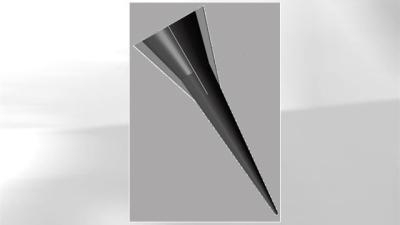Mon, Nov 21, 2011
Boost-Glide Vehicle Flew Non-Ballistic Trajectory To
Target
The U.S. Army Space and Missile Defense Command/Army Forces
Strategic Command conducted the first test flight of the Advanced
Hypersonic Weapon (AHW) concept Thursday. At 0630 EST (0130
Hawaii-Aleutian Time), a first-of-its-kind glide vehicle, designed
to fly within the earth’s atmosphere at hypersonic speed and
long range, was launched from the Pacific Missile Range Facility,
Kauai, Hawaii to the Reagan Test Site, U.S. Army Kwajalein
Atoll.
AHW U.S. Army Image

The objective of the test is to collect data on hypersonic
boost-glide technologies and test range performance for long-range
atmospheric flight. Mission emphasis is aerodynamics; navigation,
guidance, and control; and thermal protection technologies.
A three-stage booster system launched the AHW glide vehicle and
successfully deployed it on the desired flight trajectory.
The vehicle flew a non-ballistic glide trajectory at hypersonic
speed to the planned impact location at the Reagan Test Site.
Space, air, sea, and ground platforms collected vehicle performance
data during all phases of flight. The data collected will be
used by the Department of Defense to model and develop future
hypersonic boost-glide capabilities.
The AHW program is managed and executed by the U.S. Army Space
and Missile Defense Command/Army Forces Strategic Command program
office in Huntsville, Ala. The booster system and glide
vehicle were developed by Sandia National Laboratories,
Albuquerque, N.M. and the thermal protection system by the U.S.
Army Aviation and Missile Research Development and Engineering
Center, Huntsville, Ala.
The Department of Defense is using AHW to develop and
demonstrate technologies for Conventional Prompt Global Strike
(CPGS). As part of the CPGS effort, the Defense Advanced
Research Projects Agency conducted boost-glide flight tests in
April 2010 and August 2011, results from which were used in
planning the AHW flight test.
More News
“Honored to accept this mission. Time to take over space. Let’s launch.” Source: SecTrans Sean Duffy commenting after President Donald Trump appointed U.S. Secret>[...]
Permanent Echo Radar signals reflected from fixed objects on the earth's surface; e.g., buildings, towers, terrain. Permanent echoes are distinguished from “ground clutter&rd>[...]
Aero Linx: European Hang Gliding and Paragliding Union (EHPU) The general aim of the EHPU is to promote and protect hang gliding and paragliding in Europe. In order to achieve this>[...]
Glider Encountered A Loss Of Lift And There Was Not Sufficient Altitude To Reach The Airport Analysis: The flight instructor reported that while turning final, the glider encounter>[...]
Airplane Climbed To 100 Ft Above Ground Level, At Which Time The Airplane Experienced A Total Loss Of Engine Power On May 24, 2025, at 1300 eastern daylight time, an Aeronca 7AC, N>[...]
 Aero-News: Quote of the Day (07.11.25)
Aero-News: Quote of the Day (07.11.25) ANN's Daily Aero-Term (07.11.25): Permanent Echo
ANN's Daily Aero-Term (07.11.25): Permanent Echo ANN's Daily Aero-Linx (07.11.25)
ANN's Daily Aero-Linx (07.11.25) NTSB Final Report: Schweizer SGS 2-33A
NTSB Final Report: Schweizer SGS 2-33A NTSB Prelim: Aeronca 7AC
NTSB Prelim: Aeronca 7AC



